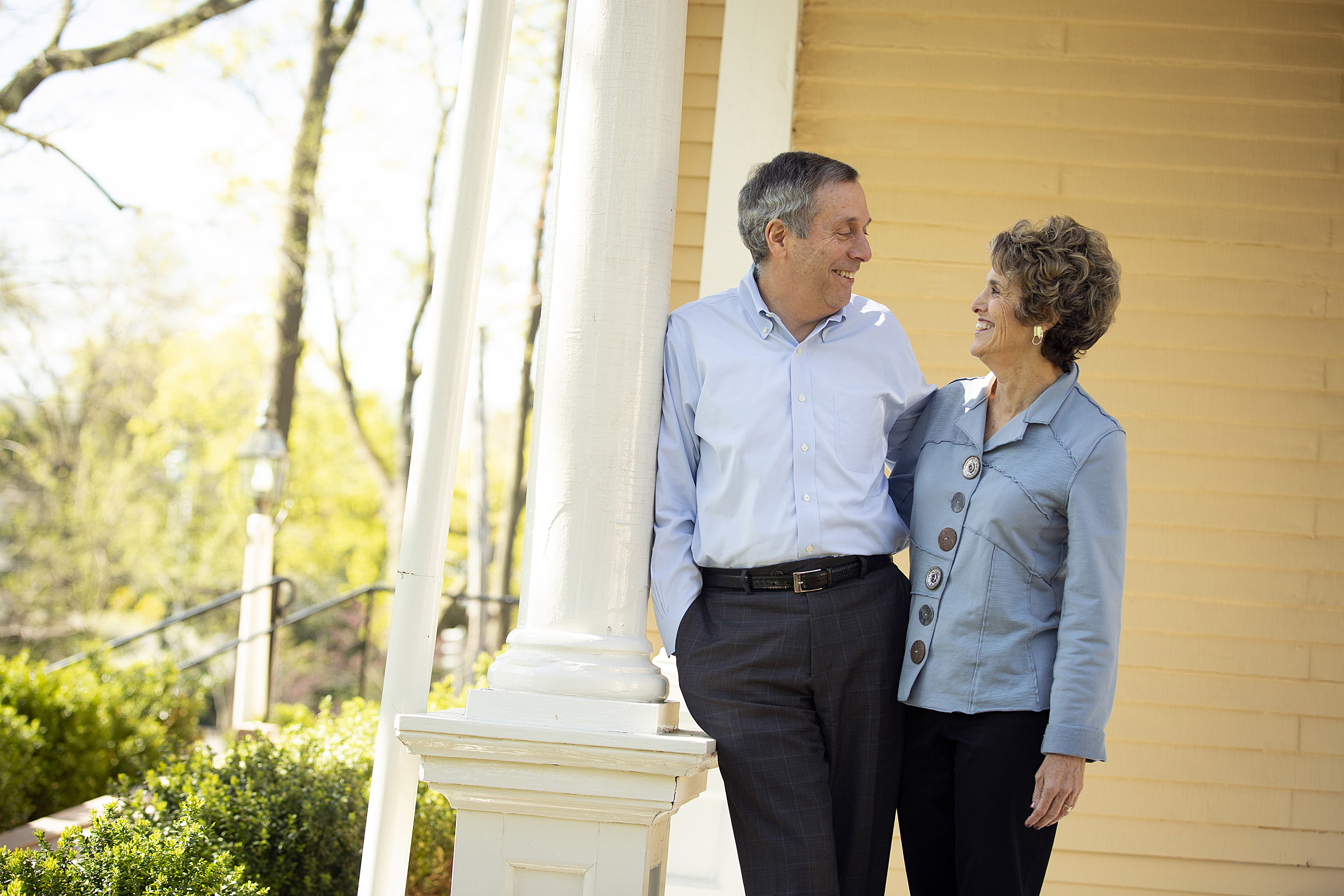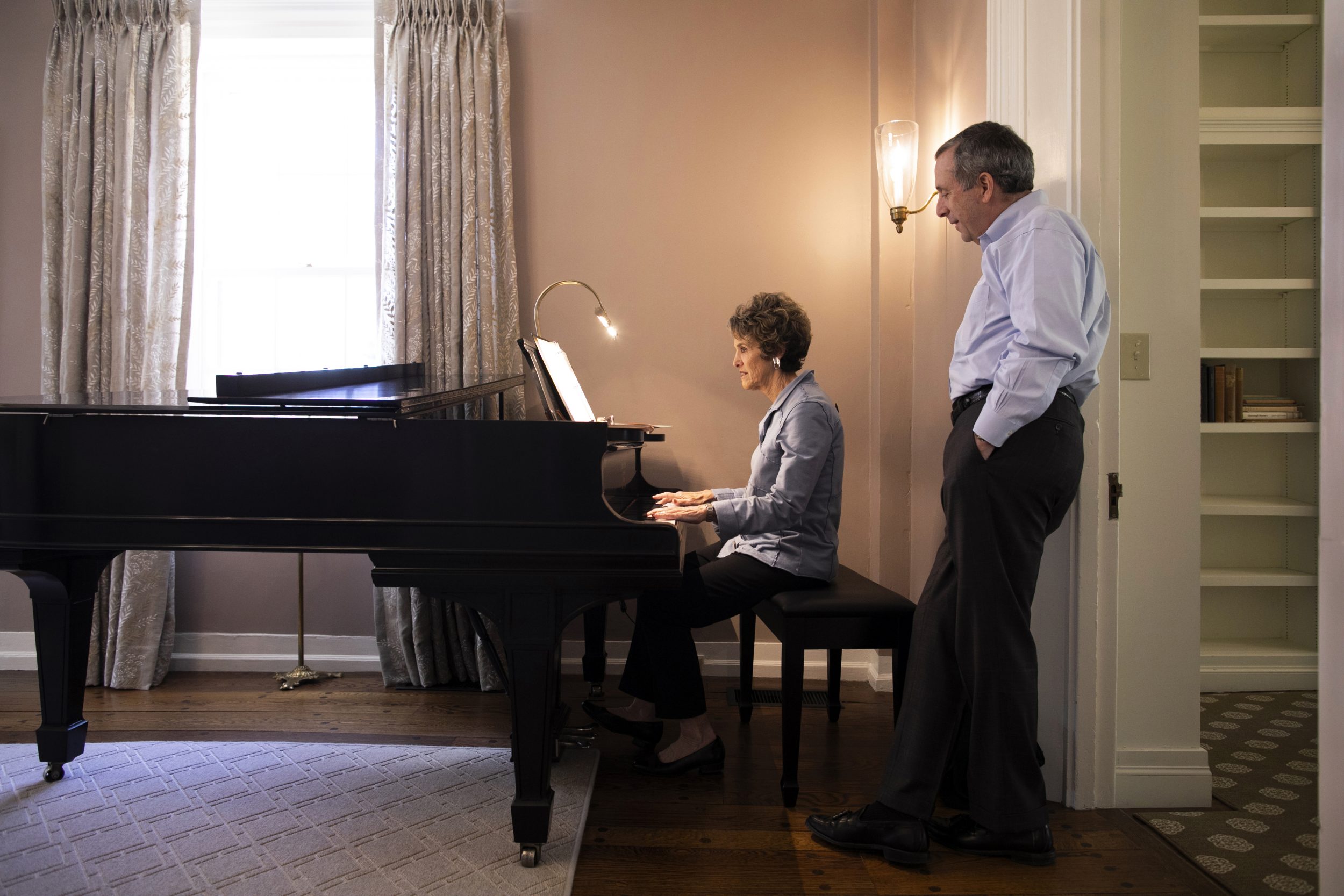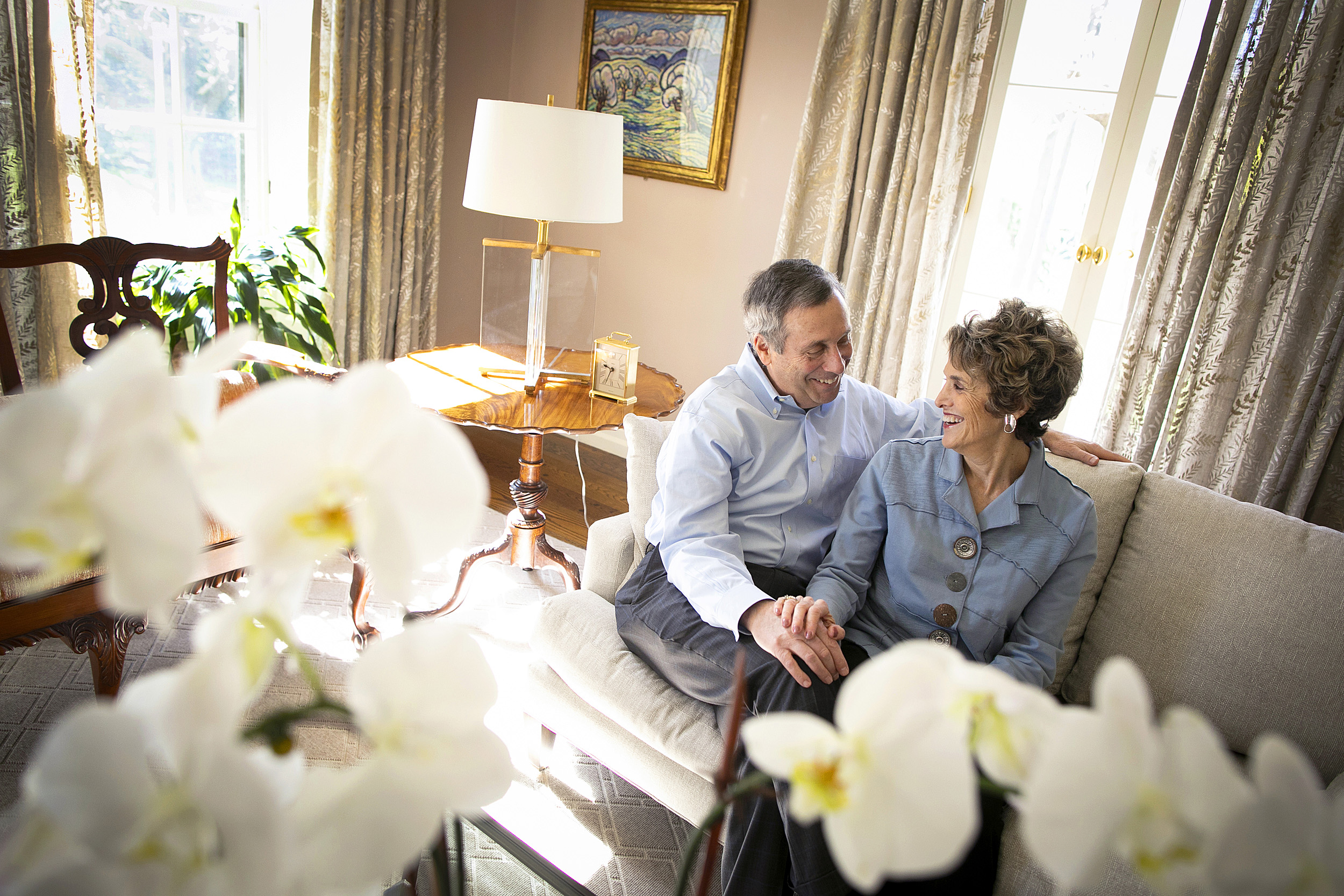
Harvard President Larry Bacow and Adele Fleet Bacow at the Elmwood residence.
Stephanie Mitchell/Harvard Staff Photographer
Reflections of a president, one year in
Larry Bacow talks about the upside of surprises, the wide impact of Harvard
During an in-depth interview, Harvard President Larry Bacow looks back on his first year in office. He also discusses the importance of truth as a principle, his commitment to public service, and what he’s anticipating most at his first Commencement as University leader.
Q&A
Larry Bacow
GAZETTE: It’s been just under a year since you took office. Is there anything that has really surprised you in that time?
BACOW: All the surprises have been on the upside. I knew and understood the job, and I knew Harvard pretty well before I took this role. In contrast, I had a lot more to learn about Tufts when I went there [as president]. But one thing that you can never truly appreciate until you sit in this position is the degree of interest in everything that goes on at Harvard. This really was driven home to me on my recent trip to China. I gave a speech at Peking University, and within hours it had been downloaded by half a million people. People are really, really interested in everything that happens here and everything the president says. I knew that intellectually, but until you experience it firsthand you can’t quite appreciate it.
The other thing that’s been really fun is getting to know the history of the place. For example, I work in a building that housed George Washington’s troops during the Revolutionary War, and I live in a house that was a military hospital for Washington’s troops during that same war. Everywhere you look at Harvard, you find history. I spent this past summer reading histories of Harvard, but now I am engaging with those histories in interesting ways, so that’s been fun.
And there have been some really special moments: welcoming first-year students in the Yard for the first time, and attending the annual Bridge Program ceremony, where we celebrate the members of our community who have become citizens in the past year through the good efforts of our students, alumni, and staff who have tutored them, and in some cases helped them learn English. That experience was quite moving.
I’ve enjoyed getting to know the faculty. For example, I met with faculty in different fields and areas to prepare for my trip to China and Japan. More recently, I have been meeting with faculty who are doing research focused on people who live outside of major U.S. cities — rural, non-urban America. It’s also fun once again to be reading tenure and promotion cases because it’s a window on the cutting-edge research that’s done in every possible discipline that’s represented here at Harvard.
GAZETTE: You mentioned your trip to China and delivering the speech at Peking University. You cited the work of a Uighur poet at the very end of that talk. Why?
BACOW: Throughout the speech, I was trying to make a number of important points, but to do so in a way that was respectful of my hosts. I wanted to speak about the importance of freedom of speech, but I didn’t want to sound as if I was lecturing to them, which is why I essentially repeated what I said in my installation address. I said, “These are the values of a great university that I spoke to my colleagues about at Harvard.” One of those values was the importance of truth, so it seemed right to close the speech by going back to that theme. My attention was called to this poem, which in substance said exactly what I wanted to say, and had the additional virtue of being authored by a member of the Uighur minority.
Now, I did not note that it was a poem that was written by a Uighur, but as soon as I mentioned the name of the poet, everybody knew. It was a way of calling attention to the fact that some voices are being stilled and deserve to be heard. I saw it as an opportunity for me to give voice to an individual, to a group of people, and to the principle of the importance of truth.
GAZETTE: That brings up the issue of free speech, a critically important topic on college campuses across this country. Can you talk a bit about why you feel it’s so important to nurture that concept here?
BACOW: I again go back to what I said in my installation address. I said that if we are committed to truth, we have to be willing to listen to those who challenge our thinking — and that’s across the ideological spectrum. Nobody has a monopoly on good ideas. Nobody has a monopoly on virtue, which is why I said in my address that we need to be quick to understand and slow to judge. I believed it when I said it on Oct. 5, and I believe it even more today.

Adele Fleet Bacow plays Chopin while her husband looks on.
Stephanie Mitchell/Harvard Staff Photographer
GAZETTE: Why?
BACOW: Because I think that there are many people who are all too willing to label others without being willing to stop, listen, and truly engage. When I say truly engage, I mean having an exchange of ideas instead of simply suggesting, “You haven’t listened to me unless you’ve agreed with me.”
GAZETTE: Shifting gears, I wonder if you could talk a bit about your commitment to public service and how you feel Harvard can help advance that work.
BACOW: As I like to say, for those of us who are fortunate and privileged to study here or work here, I think we bear a special responsibility to use the gifts that we’ve been given to try to make the world a better place. Nobody thinks that this is a perfect world. I have never met anybody who thinks that way. So we need good people who are willing to engage and to commit themselves to making it better. Anybody who comes to an institution like this bears a special responsibility to try to do that. Now, some students and alumni are going to commit to careers in public service, and we should applaud them and support them. Others will do other things, but I don’t think that takes them off the hook.
There are still opportunities for them to contribute. Everybody who graduates from Harvard should be an active, engaged, effective citizen. And by that I mean: Do more than just vote. That’s the bare minimum of what they should be doing. But we need people who are going to get involved. We need people who are willing to roll up their sleeves and say, “Our public schools in my district can be better. My neighborhood can be better.” Well, if you think that’s the case, how do you make it better? What can you do to make it so? We need people to engage on behalf of public education. We need to engage in all sorts of different dimensions.
GAZETTE: You spoke earlier about embracing the history of Harvard. Now it’s Commencement season, and I’m wondering about your previous experience with one of Harvard’s most revered traditions.
BACOW: I have been to the last seven commencements as a Corporation member, plus the two where I graduated.
GAZETTE: But this year you will be taking part as Harvard’s president. Is there anything in particular you are looking forward to? Sitting in the impressive Holyoke Chair?
BACOW: Which I sat in briefly during my inauguration — it’s not that bad. It’s not as uncomfortable as people think. I don’t think any Harvard president has been irreparably harmed by sitting in that chair during Commencement, and I doubt I will be either. The truth is I am a Commencement junkie. I love Commencement.
GAZETTE: What do you love about it?
BACOW: I love seeing not just students but also their families. In many cases these families have worked really, really hard and sacrificed so their children can come here, and it’s a fulfillment of a life dream to see their children graduate from college. For many of them, it’s one of the proudest days of their lives, and it should be. And if you do what we do, how can you not love Commencement? I love the enthusiasm of the different Harvard Houses; I love the enthusiasm of the different Schools as the president recognizes them; I love the way in which the deans embrace that enthusiasm, and in some cases play with it. I often say Commencement is always a beautiful day — sometimes we just happen to have nice weather.

Larry and Adele Bacow reside in Elmwood, home to Harvard presidents. It was built in 1767 and acquired by Harvard in 1962.
Stephanie Mitchell/Harvard Staff Photographer
GAZETTE: You were here as a student. But now as president are there any places on campus that you have recently discovered or that had been unknown to you, or that you particularly like?
BACOW: One of the challenges of being president is many people come to your office for meetings, and I have to work to get out. But I’ve become very fond of the Harvard Art Museums, and especially the Wertheim Gallery. My mother’s maiden name was Wertheim, and I actually did some genealogical research to see if there was any possibility that we were related. But the answer, unfortunately, was no. I love the views on the 10th floor of the Smith Campus Center. I try to drop in periodically to Annenberg Hall, just to have a meal with our first-year students. That’s fun. I have been trying to get around to the Houses, and I still have quite a few to go. There are many wonderful spaces in the Houses that I am still discovering.
GAZETTE: I think you were scheduled to cook for your predecessor, President [Drew] Faust, in honor of her stepping down and you taking on the role. How did that go?
BACOW: I did cook for her. That was on my first day as president, July 1. I made grilled salmon with a special rub with brown sugar, chili powder, cumin, salt, and pepper. You should ask her how it was.
GAZETTE: You mentioned reading Harvard histories. What are you reading now?
BACOW: I have not been doing much recreational reading recently because this is the season where I read a lot of tenure cases. But the next book waiting to be opened is Skip Gates’ new look at Reconstruction. I have been reading wildly enthusiastic reviews. That’s the next, but I probably won’t get started until Commencement.
GAZETTE: What about TV? Is there anything you’ve been watching? Are you a “Game of Thrones” fan?
BACOW: No, I’ve never watched it. About the only TV that I watch these days is the news, and if I have time I turn on the Celtics or the Bruins or the Red Sox.
GAZETTE: Are you running?
BACOW: I am running, not as much as I did previously. I am starting to enjoy runs around the Charles River. When we lived in Coolidge Corner, I would run around the river from Harvard on down toward Boston. Just the other day I decided to go upriver toward Watertown Square and back. But this job is not good for my running.
GAZETTE: What about getting involved with a juggling or a ham radio club, since those are interests of yours? I think Harvard has both.
BACOW: I know Harvard has a ham radio club, though I haven’t been over there yet. I see where the antenna is, so it looks like it’s somewhere close to Adams House. I haven’t done much juggling in a long time. I used to entertain my kids and their friends when they would come over and the weather was bad.
GAZETTE: How many things can you juggle at once?
BACOW: Only three. But I can juggle with someone — it’s probably 20 years since I’ve done that. I do not want to represent myself as an expert juggler, but I can keep three things in the air at once.
GAZETTE: That’s a good skill for this job.
BACOW: In this job, some days it feels like I am juggling a beach ball, a bowling ball, and a chain saw. Then there is the stamina. I used to tell people there’s a reason I run marathons, that it’s actually very good training for being a university president, and not just because it’s helping your physical stamina. Running a marathon also makes you mentally tough. In many ways, the training is less a physical act and more a mental one.
GAZETTE: When Commencement is over, what are your summer plans?
BACOW: I am going to try to spend some time sailing off the coast of Maine, some time with our kids and grandchildren, some time getting some good reading in, and some time reflecting on my first year here, which has just flown by.
This interview has been lightly edited for clarity and length.



